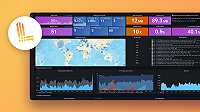Important: This documentation is about an older version. It's relevant only to the release noted, many of the features and functions have been updated or replaced. Please view the current version.
Multi-tenancy
Grafana Loki is a multi-tenant system; requests and data for tenant A are isolated from
tenant B. Requests to the Loki API should include an HTTP header
(X-Scope-OrgID) that identifies the tenant for the request.
Tenant IDs can be any alphanumeric string that fits within the Go HTTP header limit (1MB). Operators are recommended to use a reasonable limit for uniquely identifying tenants; 20 bytes is usually enough.
Loki defaults to running in multi-tenant mode.
Multi-tenant mode is set in the configuration with auth_enabled: true.
When configured with auth_enabled: false, Loki uses a single tenant.
The X-Scope-OrgID header is not required in Loki API requests.
The single tenant ID will be the string fake.
Multi-tenant Queries
In multi-tenant mode, queries may gather results from multiple tenants.
Set the querier configuration option multi_tenant_queries_enabled: true to enable queries across tenants.
The query API request defines the tenants.
Specify multiple tenants
in the query request HTTP header X-Scope-OrgID by separating the tenant IDs with the pipe character (|).
For example, a query for tenants A and B requires the header X-Scope-OrgID: A|B.
Only query endpoints support multi-tenant calls.
Calls to GET /loki/api/v1/tail and POST /loki/api/v1/push will return an HTTP 400 error if more than one tenant is defined in the HTTP header.
Instant and range queries support label filtering using tenant IDs. For example, the query
{app="foo", __tenant_id__=~"a.+"} | logfmtwill return results for all tenants
that have a tenant ID that begins with the character a.
If the label __tenant_id__ is already present in a log stream, it is prepended with the string original_.
Tenant ID filtering in stages is not supported. An example of a query that will not work:
{app="foo"} | __tenant_id__="1" | logfmt


